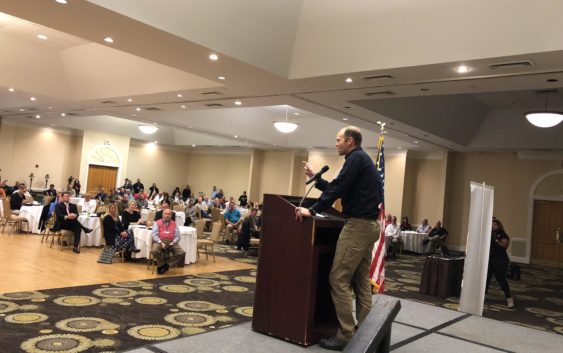- Wife & mother of four children killed in Helene flooding, husband still hospitalized
- Still searching for their loved ones, a week after Hurricane Helene
- Asheville woman creates viral list of resources to help Hurricane Helene victims
- Hurricane Helene nearly wiped this North Carolina mountain town off the map
- Inside the North Carolina mountain town that Hurricane Helene nearly wiped off the map
HURRICANE FLORENCE: More recovery funds coming

N.C. Gov. Cooper: Immediate and long-term needs in wake of storm
BRUNSWICK COUNTY — Another round of state and federal funding will be needed to continue rebuilding from the estimated $13 billion in damage caused by Hurricane Florence, Gov. Roy Cooper said Monday.
“We think we’re going to get another significant package from Congress,” Cooper said to reporters after he and Brock Long, administrator of the Federal Emergency Management Agency (FEMA) appeared at a conference of North Carolina emergency management officials held at the Sea Trail Convention Center in Sunset Beach.
The governor said money from aid packages passed by Congress and the state — totaling nearly $2 billion — needs to flow quickly to repair homes, businesses, schools and other buildings. And, he said, measures to mitigate against future storms, including affordable housing and either better rebuilding or providing relocations for people in flood-prone areas.
“Help can never come quick enough for people who have been hit by a hurricane,” Cooper said. “We’ve got to look at the long-term recovery as well.”
TO READ MORE FLORENCE COVERAGE, CLICK HERE
The governor said he believed the state legislature — which recently adopted an $850 million aid package and appropriated nearly half of it for hurricane relief — would likely appropriate more funds when it meets Nov. 27.
So far, FEMA has disbursed about $100 million in aid to 128,000 North Carolina residents affected by the storm, said Albie Lewis, federal coordinating officer for FEMA. But Long said he has heard the complaints of those who said FEMA’s application process is too complex and bureaucratic.
Long said administrators are working on suggested legislative changes to make the process easier for people dealing with a crisis.
“There’s too many different forms of assistance and we need to streamline how we work with our citizens,” he said. “I agree we need to fine tune and streamline the assistance. We are making a real effort to reduce the complexity of FEMA.”
Cooper said rebuilding has to take into account what he said is an increasing number and intensity of major storms — Florence hit North Carolina less than two years after Hurricane Matthew caused catastrophic flooding.
“We’ve got to recognize that we’re living in a different era with climate change, with more frequent storms, that this is not going to be a once-in-every-500-years occurrence,” Cooper said.
Reporter Tim Buckland can be reached at 910-343-2217 or Tim.Buckland@StarNewsOnline.com.